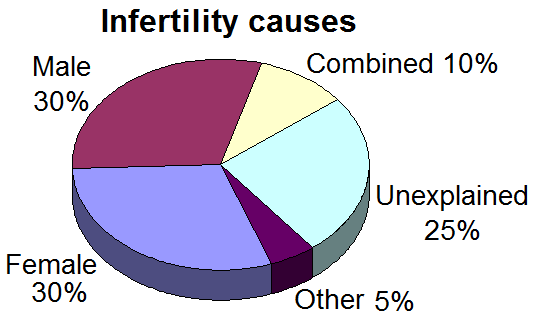Often, depression and infertility are in accord with each other.
“As her symptoms begin to define her, the feelings of sadness, fatigue, exhaustion, inadequacy, uncertainty and suicide permeate her day. Under the best of circumstances, even with sufficient support and excellent healthcare, this is a distressing picture,” Karen Kleiman MSW, LCSW talks about a woman who is suffering severe depression.
Though a lot of notions lean towards the realization that infertility can cause depression, you might be surprised to know that people who have undergone depressive symptoms have higher chances of experiencing fertility problems. Additionally, it might strike you to realize that those who have postpartum depression are couples who have previously struggled with conception problems.
“The researchers remind us that stress is the one consistent factor that shows an effect on how long it takes to get pregnant, of all the lifestyle factors studied to date. More surprising is that even low levels of stress can have an impact on conception,” Connie Shapiro PhD talks about the correlation of stress and fertility in respect to a study conducted by Dr. Alice Domar.

The bottom line is, people who are fertility challenged should not ignore the depressive symptoms that come along with the condition. Depression must be treated; otherwise, it will debilitate and take over your life severely.
When Sadness Becomes Depression
Infertility has a way to make the bearer feel sad. This is a typical occurrence. Infertility challenged individuals are often hit with sorrow once the news is revealed when treatments are unsuccessful, and if the diagnosis is final. People who are infertile will also feel heartbroken when they encounter episodes of fertility struggles and upon knowing that friends or relatives are giving baby showers left and right. This is normal sadness for infertile men or women.
“Depression is not a weakness of character, laziness, or a phase. Tough love, like telling someone to ‘buck up’ or ‘try harder,’ doesn’t work, and worsens the illness,” says Deborah Serani PsyD.
Depression, on the other hand, is something that does not get lifted quickly. It lingers and often involves a variety of symptoms that are most likely to influence your well-being and interfere with your life. Usually, the severity of depression is primarily dependent on the scope of the condition’s affectation in one’s life.

To know if you have depression when you have infertility issues, you should be experiencing the following:
- Melancholia that lasts for months
- Helplessness and hopelessness that cannot easily be shaken off
- Irritation and anger towards the people around you
- Sleep problems
- Lack of energy and motivation to accomplish tasks
- Other definitive symptoms
Causes Of Depression Related To Infertility
Infertility is not just stressful, but it can also have a considerable impact on a couple’s sex life and overall relationship, the individual’s self-worth, and the activities of daily living. Treatments and testing to counter infertility can make people feel like the condition has become their entire life due to seemingly endless doctor appointments. All of these factors, including the fact that infertility challenged individuals have a poor support network, are potential contributors to the development and progression of depression.
Furthermore, due to the feelings of shame and guilt, infertile individuals find it more challenging to communicate with family and friends about their feelings and struggles. This type of isolation also contributes strongly to the occurrence of depression.
Relieving Stress Caused By Infertility
Stress is one of the main reasons why depression occurs with infertility challenged individuals; therefore, relieving stress can be helpful in treating the disorder. It might be true that infertility is a circumstance that one cannot change, but it is the person’s own volition if they are willing to take a stand against the stress. Here are some of the ways to relieve stress caused by infertility:
- Enroll in yoga classes or other programs that teach mind-body techniques.
- Stick with calming foods and not comfort foods.
- Adopt a pet.
- Unplug from everything and escape environments that perpetuate toxicity.
- Volunteer.
- Get a new hobby or revive an old one.
- Dance or sing it out.

Is Bearing A Child The Cure For Depression?
If the primary reason why a person is depressed is due to the inability to get pregnant, it’s plausible to assume that achieving the state of being pregnant has a higher chance of getting rid of depression. Nonetheless, that’s not always true in some instances. In fact, individuals who have tried conceiving and finally becoming pregnant are more likely to experience depression during their pregnant stage, and the condition can worsen in their postpartum phase.
Deciding To Get Better
Most of the time, couples tend to hesitate to seek treatment mainly because of this notion that medications like antidepressants can significantly affect the process of conception. The truth is, not all antidepressants can adversely affect individuals who are trying to get pregnant. More so, reports are indicating the positive effects of pharmacotherapy and psychotherapy on women who are trying to conceive. Aside from medications, depression treatments include mind-body therapies, talk therapy, and support groups.
For couples that are undergoing infertility and depression issues, talking to your medical provider is necessary. Usually, if both conditions are present, a psychiatrist and a fertility doctor would work hand-in-hand to provide optimum care and counseling.